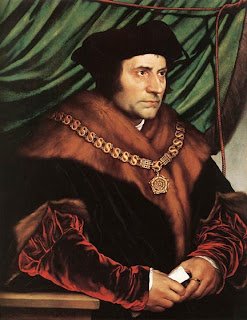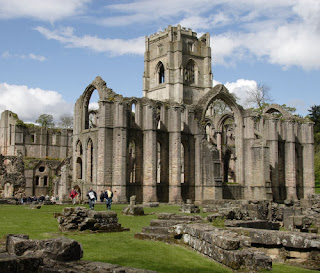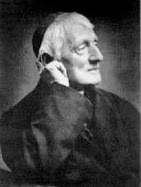Hat tip to Taylor Marshall (Canterbury Tales blog) for alerting us to this new website for the Center for Thomas More Studies (CTMS) at the University of Dallas. It looks like a great source of all things related to the man whom his friend, Erasmus, (and also Robert Whittington, according to the CTMS website) called "a man for all seasons." Regular readers of this blog know that St. Ths. More is my patron saint, so I am especially pleased to have this new resource at my fingertips. Check them out at http://www.thomasmorestudies.org/.
Wednesday, June 30, 2010
Friday, June 25, 2010
Anglican Use Conference 2010 - Part II: The Servant of the Servant
 I have attended four successive Anglican Use conferences, and at each of the previous three there has been a point at which someone in authority has had to stand up and remind us that we are not in Canterbury anymore. That is, in the midst of a discussion about what the Pastoral Provision might look like in the future--possible revisions to the Book of Divine Worship, the training of future priests for Anglican Use parishes, etc.--we have tended to slip into a "strategizing" attitude. Put another way, the discussion turns to what we might negotiate with the Holy See in order to preserve our Anglican patrimony. Not that negotiation itself is bad; it is indeed necessary to work out the nuts-and-bolts of what the new Ordinariate will look like. But ultimately, the decisions will not be the result of a mere consensus between Anglicans and the Holy See. They will have the weight of the Magesterium behind them, because the buck stops at the desk of the Holy Father.
I have attended four successive Anglican Use conferences, and at each of the previous three there has been a point at which someone in authority has had to stand up and remind us that we are not in Canterbury anymore. That is, in the midst of a discussion about what the Pastoral Provision might look like in the future--possible revisions to the Book of Divine Worship, the training of future priests for Anglican Use parishes, etc.--we have tended to slip into a "strategizing" attitude. Put another way, the discussion turns to what we might negotiate with the Holy See in order to preserve our Anglican patrimony. Not that negotiation itself is bad; it is indeed necessary to work out the nuts-and-bolts of what the new Ordinariate will look like. But ultimately, the decisions will not be the result of a mere consensus between Anglicans and the Holy See. They will have the weight of the Magesterium behind them, because the buck stops at the desk of the Holy Father.Last year in Houston it was Father John Lipscomb (at the time he was merely "John Lipscomb," the former Episcopal Bishop of Southwest Florida) who reminded us of our true position when we came into the Catholic Church--that of supplicants asking to be allowed in. He recalled the story of the Prodigal Son, who returned to his father with nothing, asking only to be allowed a place with the servants. As Protestants we were in an analogous position, although in our case the sin of apostasy was inherited from previous generations. Nevertheless, at some point every Catholic convert realizes he has been participating in the sin of schism, whether or not he articulates it exactly in those terms. For me, that is exactly how I described my position as a Protestant. At that point, the only appropriate attitude is humble supplication, which doesn't come naturally for the average Anglican. Hence the need for this yearly reminder.
This year, things were a bit different. Anglicanorum coetibus has of course changed everything, and I think that most participants at this year's conference are well aware what a great gift Pope Benedict has given those who, in the words of William Oddie, have been "shivering at the gates" of the Church. In that spirit of humble gratitude the president of the Anglican Use Society, Joe Blake, opened our annual meeting on just the right note, reiterating his own position by declaring, "this is not Voice of the Faithful." That is, we are not a group of dissidents attempting to bend the Church to our way of thinking. (The motto on the VOTF website is, "Keep the faith, change the Church." Ugh.) Mr. Blake assured us that he accepted this position to serve--to serve the Church and the Holy Father. And his words reminded us why he was chosen for this post in the first place. Last year he indicated his intention to step down and offer someone else a chance to lead, but in light of recent developments he has graciously agreed to stay on for the sake of continuity during this time of transition.
But to get back to the Prodigal Son analogy: Thanks be to God that in Pope Benedict we have a Holy Father like the father in the parable. One who has been watching for us for decades and who has now done more than we would have dared imagine even a year ago. Like the father in the story, he saw us coming and ran to meet us, and, to carry the analogy further, with Anglicanorum coetibus he has killed the fatted calf and invited our separated brethren in. This is not a question of mere toleration, either. The document refers to our Anglican disciplines as "a precious gift nourishing the faith of the members of the Ordinariate and... a treasure to be shared." And I am persuaded that the ultimate purpose of the Holy Father is not merely to reconcile Anglicans but all of our separated brethren. Ut unum sint.
Tuesday, June 22, 2010
The King's Good Servant
 Today is the Feastday of St. Thomas More, my patron saint, and of his companion in martyrdom, St. John Fisher. Thomas More, of course, resigned his post as Chancellor of England rather than go along with Henry VIII's attempt to make himself Supreme Head of the Church in England. John Fisher was Bishop of Rochester at the time and the only one in the House of Bishops who challenged Henry head on, and he lost his head for it on this date in 1535. Thomas More followed him on July 6.
Today is the Feastday of St. Thomas More, my patron saint, and of his companion in martyrdom, St. John Fisher. Thomas More, of course, resigned his post as Chancellor of England rather than go along with Henry VIII's attempt to make himself Supreme Head of the Church in England. John Fisher was Bishop of Rochester at the time and the only one in the House of Bishops who challenged Henry head on, and he lost his head for it on this date in 1535. Thomas More followed him on July 6.Considering the upheaval that King Henry precipitated in subsequent years and which was continued by his daughter, Elizabeth I, I wonder that there is anyone today willing to make excuses for either of them. And yet, even my own actions (or inaction, to be more precise) served as an apology for the English schism.
John Henry, Cardinal Newman spoke the truth when he said that "to be deep in history is to cease to be a Protestant." One of the first things that pricked my own conscience regarding the roots of Anglicanism was my study of English History as an undergraduate. I was a mediocre student in those days, but I did read and pay close attention to the part about the dissolution of the monasteries. It made me uneasy, and it planted seeds of doubt in my mind about the Anglican experiment. That is, I wondered whether any project which began with what amounted to a giant government land grab was doomed to failure in the end. Yet it would be another 25 years before I concluded that I had to return to the Church of my pre-Reformation ancestors, the Catholic Church.
In 2004, two years before we sought reception into the Catholic Church, my husband and I visited the ruins of Fountains Abbey in North Yorkshire.
 Seeing that empty shell brought home to me the real consequences of Henry's ambitions, and it increased my uneasiness with their historical fruits. It also saddened me, not only because of the wanton destruction of the beautiful Abbey Church, but also because of the social upheaval that followed, since the wealth of the Abbey functioned as an important social "safety net" for the poor in the region. My husband and I both count that trip as a significant stage of our journey from Canterbury to Rome.
Seeing that empty shell brought home to me the real consequences of Henry's ambitions, and it increased my uneasiness with their historical fruits. It also saddened me, not only because of the wanton destruction of the beautiful Abbey Church, but also because of the social upheaval that followed, since the wealth of the Abbey functioned as an important social "safety net" for the poor in the region. My husband and I both count that trip as a significant stage of our journey from Canterbury to Rome.Of course, the persistent prayers of St. Thomas More--and St. John Fisher, and (soon-to-be) Blessed John Henry Newman--had a great deal to do with getting us here, too. No doubt the promulgation by Pope Benedict last November of Anglicanorum coetibus is also a result of their prayers.
We would do well to join with them in praying for the Holy Father's upcoming visit to the UK in September, that it might help further our Lord's desire that we might all be one.
Almighty Father, whose blessed Son before his passion prayed for his disciples that they might be one, even as thou and he are one: Grant that thy Church, being bound together in love and obedience to thee, may be united in one body by the one Spirit, that the world may believe in him whom thou didst send, the same thy Son Jesus Christ our Lord; who livest and reigneth with thee, in the unity of the same Spirit, one God, now and forever. Amen.
Collect For the Unity of the Church
Book of Divine Worship
Book of Divine Worship
Monday, June 14, 2010
Anglican Use Conference 2010 - Part I
Thanks to the promulgation last October by the Holy Father Pope Benedict XVI of the apostolic constitution for Anglicans, Anglicanorum coetibus, the atmosphere of this year's conference was rather different from that of last year's--needless to say. Last year we knew something was imminent from the Holy See, but we didn't know exactly what it would look like or what the response would be from effected groups of Anglicans. This year, of course, we know much more of both, although there are many details still to be worked out.
I will write more on the conference later, once I've had a chance to reflect on the event and to see what others have written already (see list of links below). But I will offer one or two comments:
First, I was struck this year by the presence of a number of newcomers to the conference, especially the three people pictured above. The man at the lecturn is Archbishop John Hepworth of Australia, primate of the Traditional Anglican Communion (TAC), the group of Anglicans whose formal petition to the Holy Father in 2007 got this ball rolling in the first place. For which, by the way, I and many others are exceedingly grateful. To the right of him is Bishop David Moyer of the Anglican Church in America (ACA--the US branch of the TAC) and finally, Bishop Carl Reid of Canada. Bishop Falk, first primate of the TAC and current President of the House of Bishops of the ACA, had been present earlier in the conference but was not there on Saturday, when Abp. Hepworth spoke to the participants. I was enormously encouraged by Abp. Hepworth's remarks and by the presence of all of these men. Their journey to this point has been more circuitous than mine was, certainly, and it has not been an easy one for them. But they are ready, I think, to cross the river. They have a number of pastoral and other details to work out with the Holy See in the future, but it appears that they have put their hand to the plow and are determined to be reconciled with Holy Mother Church. Please join me in praying for them and those under their pastoral care as they continue this process.
One other note regarding the Mass on Friday, a Solemn High Mass according to the Anglican Use. Since Friday was the Solemnity of the Sacred Heart of Jesus, it was fitting that it was held at the Cathedral Basilica of the Sacred Heart. Photos of the Mass and from the rest of the conference are available at the website of Our Lady of Walsingham Parish in Houston (link below). Fr. Jeffrey Steenson, former (Episcopal) Bishop of the Diocese of the Rio Grande, was the celebrant. Video clips of his excellent homily can be found on the Anglican Use of the Roman Rite blog (link below). I learned afterward that this was the first Solemn High Mass OF ANY KIND held at this Cathedral in some 40 years!
Our Lady of Walsingham (conference photos):
http://www.walsingham-church.org/wc/Photos/Pages/AU_Conference.html
Anglican Use of the Roman Rite blog (Fr. Steenson's homily):
http://anglicanusenews.blogspot.com/2010/06/homily-of-fr-jeffrey-steenson-at-mass.html
The Anglo-Catholic blog (more details of the conference):
http://www.theanglocatholic.com/tag/anglican-use-conference/
Subscribe to:
Posts (Atom)






